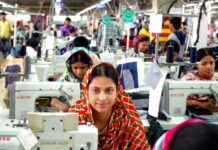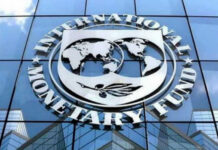
The signing of Trade and Investment Cooperation Forum Agreement (Ticfa) between Bangladesh and the US will be meaningless if the country’s products do not get duty-free access to the American market, Commerce Minister Tofail Ahmed said yesterday.
“So, I want the US to give us duty-free access,” Ahmed said at the inauguration of the 23rd US Trade Show.
The American Chamber of Commerce in Bangladesh (AmCham) and the US embassy in Dhaka are jointly organising the three-day exhibition at the capital’s Sonargaon Hotel.
Most of the developed and developing countries allow duty-free access to all Bangladeshi products; the US, however, gives the privilege to only selected items from Bangladesh, he said.
Garment products, which form the bulk of the country’s export basket, do not get duty-free access to the US; they are subjected to 15.61 percent duty.
“The other competing countries of Bangladesh in this field pay much less for exports to the same market,” the commerce minister said.
With high hopes of securing duty-free access for its garment products, Bangladesh last year signed the Ticfa, a platform to resolve trade-related disputes between the two countries through discussions.
The first Ticfa forum meeting was held in Dhaka in April, with the second due to be held next year in Washington.
Currently, 50 US companies out of the 250 AmCham members have direct business in Bangladesh. “We want more US companies to come to Bangladesh with more investment.”
The US should also extend ten-year multiple entry visas to Bangladeshi citizens, the commerce minister said.
Regarding the downward trend in exports in the first quarter of the fiscal year, the minister blamed the suspension of the Generalised System of Preferences to the US market and the cautious behaviour of retailers after the Rana Plaza collapse.
Ahmed though is still hopeful of hitting fiscal 2014-15’s export target of $33.20 billion.
After the recent spate over duty issue on garment exports to the US, both Ahmed and Dan W Mozena, the US ambassador to Bangladesh, appeared to be in good mood on the dais.
In his speech, Mozena said the government must play a leading role in ensuring that Bangladeshi enterprises, especially in the apparel industry, meet international standards for workplace safety, respect for workers’ rights and protection of the environment.
“I imagine the day when a shopper in America, whether shopping at the most expensive clothing stores or at those selling lower-cost clothes, will find himself or herself flipping through racks and racks of clothes that are made in Bangladesh, that
are made with great pride in Bangladesh.”
“Brand Bangladesh would be a treasured brand, a premium brand, a much sought brand, the best brand in the world, and Bangladesh, the largest exporter of apparel to America.”
He went on to mention an array of products that have the potential to be as successful as garment products on the global stage, such as pharmaceuticals, frozen foods, footwear, quality leather goods and IT products.
“That shopper will go to the shoe department and buy ‘Made in Bangladesh’ top quality shoes and belts and purses and wallets and other exquisite leather products.”
About increased US investment in the country, Mozena said the government has a central role to play in creating conditions that will attract massive inflows of investment and technology.
Improved rule of law, reduced corruption, less red tape and diminished threat of political instability would do much to attract the flood of needed investment.
About Bangladesh’s huge surplus in trade balance between the two countries, Mozena referred to a story from the early 1960s in the Time magazine which termed the then huge volumes of British exports to the American market as the “British Invasion”.
“I think America should prepare for another friendly invasion. I can imagine a time 10-15 years from now when the cover of Time magazine will again feature a screaming headline telling of a new invasion of America. This time it will be the Great Bangladesh Invasion.”
In fiscal 2013-14, Bangladesh exported $5.59 billion worth of goods to the US and imported $801.10 million. The year before, it exported $5.41 billion and imported $537.80 million, according to data from the commerce ministry. Of the total exports, 95 percent is apparel items.
Aftab-ul-Islam, AmCham president, said 43 US firms are showcasing products across 78 booths at the fair.
Many Fortune 500 listed firms, including Boeing, Coca-Cola Company, Ford Motor Company, Caterpillar, Dell, IBM, Harvard University, Microsoft, PepsiCo International and MasterCard, are taking part in the event, he said.
The entry fee for the fair is Tk 20 a person, but students with uniform and identity cards will enjoy free access.
Source: The Daily Star









